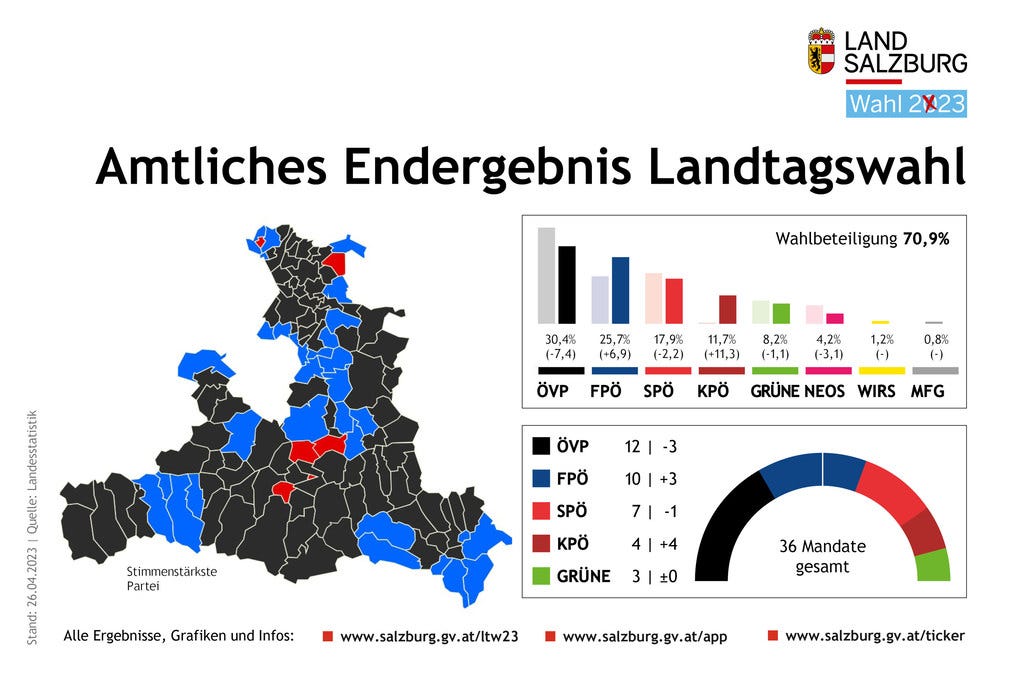The Hills Are Awry
Salzburg's People's Party has elected to go into coalition negotiations with the far-right Freedom Party after their bid for a three-party government failed

Servus!
In 2018, Lower Austria governor Johanna Mikl-Leitner ruled out any kind of cooperation with local far-right Freedom Party (FPÖ) leader Udo Landbauer, and during her re-election campaign earlier this year explicitly warned of the danger that the FPÖ and the Social Democratic Party (SPÖ) might join up in order to oust her People’s Party (ÖVP) from power. The mirror has two faces, and so does Mikl-Leitner; after losing her absolute majority in the Lower Austrian state parliament following January’s vote, she committed an abrupt volte-face and formed a coalition with the FPÖ, making Landbauer lieutenant governor in the process.
History, evidently, is doomed to repeat itself. In the run-up to last month’s elections in Salzburg, governor Wilfried Haslauer (ÖVP) not only rejected parts of Mikl-Leitner’s deal with the FPÖ, specifically a plan to use state funds to compensate those who violated COVID-19 rules, but also bemoaned the “coarsening” of political discourse in Austria, comparing the current situation to how things were in the 1920s, calling out the FPÖ in the process. A coalition deal with the FPÖ on Haslauer’s part would be unthinkable, would it not? But as the writer and historian warned in the title of his 2018 performance piece, Alles kann passieren: Anything can happen.
Following April 23’s vote, the Salzburg VP’s share of the vote fell by more than seven points to 30.37 percent. Because of this, and because the liberal NEOS’ vote share dropped below the five percent electoral threshold to enter parliament, Haslauer’s existing ÖVP-Green-NEOS coalition became an impossibility. He needed a new coalition partner—or partners—and on paper the choices were three-fold: the FPÖ, who finished second in the election and increased their vote share by almost seven points; the SPÖ; or a three-party coalition with the SPÖ and Greens.
Initially, however, Haslauer tried to push for a most extraordinary agreement: a nonsensical “Alliance for Salzburg,” a broad three-party coalition involving the ÖVP, FPÖ, and SPÖ. The far-right were reportedly open to the idea in the beginning, but last week the SPÖ ruled it out entirely, arguing they would not act as the FPÖ’s fig leaf. Come Tuesday morning, the SPÖ tried to do a 180, saying they were open to an alliance after all, only for the FPÖ to then say the door was firmly shut on such an arrangement. Perhaps the SPÖ knew what was coming, and thought their best hope was to negotiate for a three-party coalition in order to block something even worse.
And even worse did indeed arrive Tuesday lunchtime when, succumbing to reported pressure from inside the ÖVP, specifically local mayors in his state, Haslauer announced his party’s intention to enter into coalition negotiations with the FPÖ. He may not have wanted such a coalition, local Communist Party (KPÖ) leader Kay-Michael Dankl tweeted, but various interest groups inside his party did. If negotiations succeed, Salzburg will become Austria’s third state to be run by an ÖVP-FPÖ coalition, creating a formidable right-wing power axis stretching from St. Pölten in the east to Salzburg in the west.
In Upper Austria, in Lower Austria, and now in Salzburg, the ÖVP has chosen as its coalition partner not the most suitable date but the cheapest. First Mikl-Leitner and then Haslauer attempted to argue that they were boxed into a corner essentially: that the SPÖ was too demanding and had made it impossible to form a coalition with them, and thus they had to turn to the FPÖ as the only other available option. These, of course, are weasel words; they both have to accept responsibility for the choices they have made: the decision to go into government with the FPÖ in spite of their politics on immigration, COVID-19, and Ukraine as well as their ties to greater German nationalism and other forms of far-right extremism. The opposition is not to blame for the government’s choices. The government is.
Bis bald!
Thank you for subscribing to the Vienna Briefing. If you know someone who might be interested in receiving this newsletter, consider sharing it with them today.
The Vienna Briefing is a reader-supported publication. If you would like to support my work, think about sending me a tip via PayPal. Thank you to all contributors.
Red-On-Red Violence
SPÖ leader Pamela Rendi-Wagner attacked former party leader Christian Kern as “characterless” after he endorsed her rival, Burgenland governor Hans Peter Doskozil, in the party’s leadership contest. Voting continues through May 10.
Inflation Climbs Again
The rate of inflation in Austria hit 9.8 percent in April, according to initial estimates, up from 9.2 percent in March. Rising prices in the travel and leisure sectors were to blame.
Dive In
Vienna’s lidos re-opened yesterday, marking the beginning of the summer swimming season. The price of a day ticket has gone up to €7 for adults and €2.40 for children.



